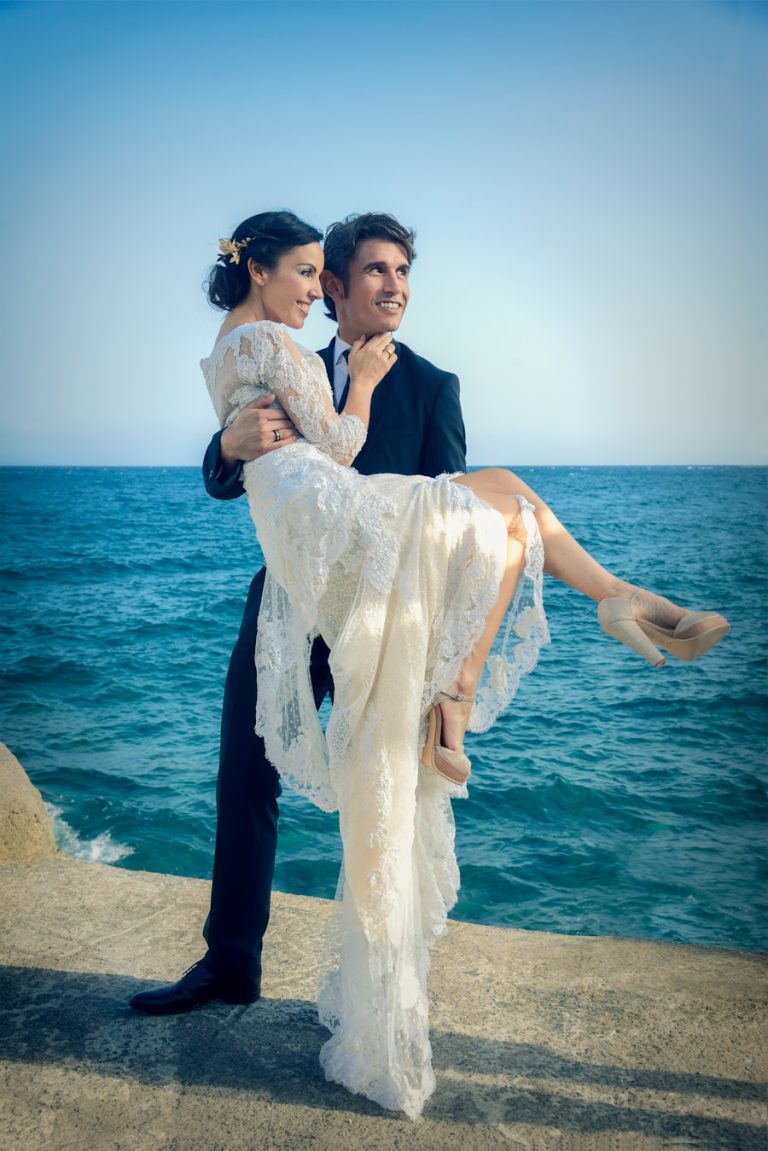Trend Alert: Greek Wedding Fashion Trends to Watch

When you think of a traditional Greek wedding, the first image that often comes to mind is the bride adorned in a stunning gown that reflects the rich cultural heritage of Greece. Traditionally, Greek brides wear a white dress, symbolizing purity and new beginnings. However, the attire is not just about the color; it is also about the intricate details that make each gown unique.
Many brides opt for dresses embellished with delicate lace, embroidery, and sometimes even gold thread, which adds a touch of opulence. The traditional wedding dress is often complemented by a veil, which can be long and flowing or short and simple, depending on personal preference. The groom's attire in a traditional Greek wedding is equally significant.
He typically wears a formal suit, often in dark colors like navy or black, paired with a crisp white shirt. In some regions, grooms may choose to wear a traditional outfit known as the "foustanella," which consists of a pleated skirt-like garment and a fitted jacket. This attire not only showcases the groom's heritage but also adds a unique flair to the wedding ceremony.
Accessories such as a decorative belt or a traditional cap can further enhance the groom's look, making him stand out on this special day.
Key Takeaways
- Traditional Greek wedding attire is characterized by the use of rich fabrics, intricate embroidery, and traditional silhouettes such as the poukamiso for men and the karsikaki for women.
- Modern Greek wedding fashion trends include the incorporation of contemporary elements such as sleek lines, modern fabrics, and innovative designs while still maintaining a nod to tradition.
- Greek-inspired bridal accessories often feature elements such as olive leaves, laurel wreaths, and intricate gold jewelry, reflecting the rich cultural heritage of Greece.
- Groom's fashion in Greek weddings is influenced by traditional attire such as the foustanella, a pleated skirt, and the use of bold colors and patterns in the groom's attire.
- Greek wedding color palette trends often include a combination of classic white and blue, as well as earthy tones such as olive green and terracotta, reflecting the natural beauty of Greece.
- Greek wedding fashion is influenced by the rich history and art of ancient Greece, with elements such as draping, intricate patterns, and the use of gold and silver embellishments being prominent in modern designs.
Modern Greek Wedding Fashion Trends
Modern Brides: A Blend of Tradition and Elegance
Modern Greek brides are opting for sleek, minimalist designs that emphasize clean lines and elegant silhouettes. These gowns often feature unique elements such as asymmetrical necklines or open backs, allowing brides to express their individuality while still adhering to traditional customs. The use of luxurious fabrics like silk and satin has also become more prevalent, giving modern gowns an air of sophistication.
Grooms: Stepping Away from Tradition
Grooms are also moving away from traditional attire, opting for more fashionable options. While many still choose classic suits, there is a growing trend towards lighter fabrics and brighter colors, especially for summer weddings. Grooms may opt for tailored suits in shades like light gray or even pastel hues, which can create a fresh and vibrant look.
A Dynamic Atmosphere
This blend of tradition and modernity creates a dynamic atmosphere at Greek weddings, appealing to both older generations and younger couples alike. The result is a unique and unforgettable celebration that honors the past while embracing the present.
Greek-Inspired Bridal Accessories

No bridal look is complete without the right accessories, and Greek weddings offer a plethora of options that can elevate your ensemble to new heights. One of the most iconic accessories for a Greek bride is the stefana, a pair of crowns made from intertwined flowers or metal that symbolize the couple's union. Traditionally worn during the ceremony, these crowns are often adorned with intricate designs and can be customized to reflect personal tastes.
Wearing stefana not only adds a beautiful touch to your look but also connects you to centuries of tradition.
For instance, pieces adorned with olive branches or laurel leaves can serve as a nod to Greece's rich history while adding elegance to your overall appearance.
Veils are another essential accessory; whether you choose a long cathedral veil or a shorter style, it can beautifully frame your face and complete your bridal look. By carefully selecting accessories that resonate with your personal style and cultural heritage, you can create a cohesive and stunning bridal ensemble.
Greek-Influenced Groom's Fashion
While much attention is often given to bridal fashion, grooms also have the opportunity to showcase their style on their wedding day. Greek-influenced groom's fashion has evolved over the years, blending traditional elements with modern trends to create unique looks that reflect personal taste. One popular choice is the use of tailored suits that incorporate traditional Greek patterns or fabrics.
For example, grooms may choose suits made from lightweight linen for summer weddings or opt for rich wool blends in cooler months. Accessories play a crucial role in completing the groom's look as well. A well-chosen tie or bow tie can add a pop of color or pattern that complements the overall wedding theme.
Additionally, cufflinks featuring symbols from Greek mythology or family crests can serve as meaningful touches that honor heritage. Footwear is another area where grooms can express their style; whether opting for classic leather shoes or more contemporary loafers, the right pair can tie the entire outfit together. By embracing both tradition and modernity, grooms can create a memorable look that reflects their personality on this significant day.
Greek Wedding Color Palette Trends
The color palette for Greek weddings has seen significant evolution over the years, moving beyond traditional whites and blues to embrace a wider spectrum of hues. While classic colors like white and blue remain popular due to their association with the sea and sky of Greece, modern couples are increasingly experimenting with bolder shades. Rich jewel tones such as emerald green, deep burgundy, and royal purple are becoming favorites for fall and winter weddings, adding depth and warmth to the celebration.
In addition to bold colors, soft pastels are also gaining traction among couples looking for a romantic aesthetic. Shades like blush pink, lavender, and mint green can create an ethereal atmosphere that complements outdoor settings beautifully. These colors can be incorporated into various elements of the wedding, from floral arrangements to table settings and even bridal party attire.
By thoughtfully selecting a color palette that resonates with your vision for the day, you can create an enchanting ambiance that reflects your unique love story.
Greek Wedding Fashion Influences from Ancient Greece

The influence of ancient Greece on modern wedding fashion cannot be overstated. Many elements of contemporary bridal attire draw inspiration from the flowing lines and draping techniques seen in ancient garments like the chiton and himation. These historical pieces were characterized by their elegant silhouettes and use of luxurious fabrics, which continue to inspire designers today.
Modern brides may incorporate these elements into their gowns through draped bodices or flowing skirts that evoke the gracefulness of ancient styles. Additionally, motifs from ancient Greek art and architecture often find their way into wedding fashion. Patterns inspired by Greek key designs or floral elements reminiscent of ancient pottery can add a timeless quality to bridal accessories or groom's attire.
The use of gold accents—whether in jewelry or embroidery—also pays homage to the opulence associated with ancient Greek culture. By embracing these influences, couples can create a wedding aesthetic that honors their heritage while celebrating their love in a contemporary context. In conclusion, whether you lean towards traditional attire or modern trends, Greek wedding fashion offers an array of options that allow you to express your individuality while honoring your cultural roots.
From stunning bridal gowns adorned with intricate details to stylish groom's ensembles that blend tradition with contemporary flair, there is something for everyone in this vibrant celebration of love. By thoughtfully selecting attire and accessories that resonate with your personal style and heritage, you can create an unforgettable wedding experience that reflects who you are as a couple.
FAQs
What are the current Greek wedding fashion trends to watch?
Some current Greek wedding fashion trends to watch include traditional Greek wedding dresses with modern twists, intricate lace details, off-the-shoulder styles, and statement headpieces.
What are some popular colors for Greek wedding fashion?
Popular colors for Greek wedding fashion include classic white, ivory, and champagne for wedding dresses, as well as pastel shades such as blush, lavender, and sage for bridesmaid dresses.
What are some traditional elements incorporated into modern Greek wedding fashion?
Some traditional elements incorporated into modern Greek wedding fashion include the use of intricate embroidery, delicate lace, flowing silhouettes, and the incorporation of symbolic motifs such as olive branches and Greek key patterns.
What are some popular accessories for Greek wedding fashion?
Popular accessories for Greek wedding fashion include statement headpieces such as gold leaf crowns, delicate hair vines, and traditional Greek-style sandals with intricate embellishments.
Where can one find Greek wedding fashion inspiration and trends?
One can find Greek wedding fashion inspiration and trends from bridal magazines, fashion blogs, social media platforms such as Pinterest and Instagram, as well as by attending Greek weddings or cultural events.







